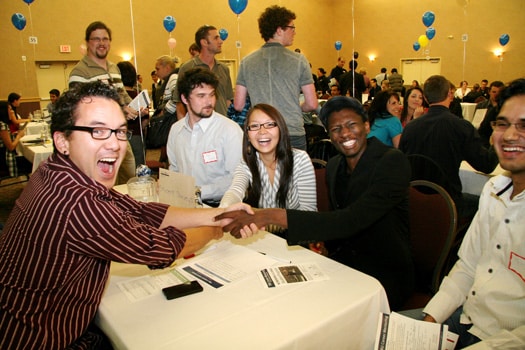The Neuroscience of Networking: Why Networking Matters To Your Conference
Your brain is passionate about one thing.
So much so that when it is not thinking about a problem or focused on something specific, it defaults to doing this one thing.
Neuroscientist Dr. Matthew Lieberman says that our brains have a passion of their own. “We know this because our brains seem to devote all of its spare time to this one thing,” says Lieberman.
Thinking About Thinking
So what is it that our brains really like to do?
What does the brain do when it is not focused on a cognitive, motor or visual task?
Try this experiment suggested by Dr. Lieberman:
Set your mobile device timer for 30 seconds.
Now close your eyes for those 30 seconds. Then open them.
What did you think about?
If you’re like most people, your mind jumped from thought to thought. You probably thought about your email, what to eat next, what to do this evening and who you need to call. You also probably thought about yourself and others: your spouse, family, friends and co-workers.
You engaged in what Dr. Lieberman and other psychologists call social cognition: thinking about yourself, others and your relation to others.
Social Cognition: The Brain’s Natural Reflex
In 1997, researchers at Washington University discovered that our brains default to social cognition when not focused on other cognitive tasks. In other words, when our brain is at rest, it starts making sense about our self and our relationships to others.
It also thinks about new people that we’ve met and how they fit within our social circles.
Our brains are built to be thinking about socializing with others. It uses its free time to process and reprocess information about those around us.
“In essence, our brains are built to practice thinking about the social world and our place in it,” says Lieberman.
We Are Hardwired To Connect
This explains why networking with others at a conference it is so important to us.
In our free time, our brain defaults to the social world. We start thinking about others and what they are thinking about: their thoughts, feelings and goals.
We spend our entire lives motivated by social connections says Lieberman. So much so, that our brains do not recognize a difference between social and physical pain.
Ultimately, we are hardwired to socially connect. It’s just part of our brain’s natural biology. We have a built-in brain curiosity to wonder what other people are thinking.
Ignoring Conference Networking And Socialization Can Cause Pain
Humans are adapted to be social creatures.
But our conferences are not adapted to us. Conferences force us to be outsiders in an institutionalized experience that doesn’t align with our brain’s natural desire to socialize.
When we force people at conferences into jammed packed schedules with no down time, no scheduled networking and no time to connect with others, we are going against the brain’s natural inclinations.
When we create passive listening education sessions where the only one talking is the presenter, we compete with the brain’s desire to connect with others, network and share thoughts.
Neuroscience research shows that ignoring the social well being of others actually harms them explains Lieberman. When conferences ignore creating opportunities for attendees to socialize, it can lead to decreased productivity and performance as well as real social pain.
Our brains are designed to reach out to and interact with others. It is not a design flaw, says Lieberman, rather it is a design feature! These social connections are critical to having a successful life…and a successful conference!
Source: Social: Why Our Brains Are Wired To Connect by Matthew D. Lieberman.
What are some ways conference organizers can foster attendees’ connecting and socializing? What tips can you share about leveraging conference networking?



[…] The Neuroscience of Networking: Why Networking Matters To Your Conference —Midcourse Corrections “In 1997, researchers at Washington University discovered that our brains default to social cognition when not focused on other cognitive tasks. In other words, when our brain is at rest, it starts making sense about our self and our relationships to others.” […]
Change the conference schedule! no less than 30 minutes between rounds of concurrent sessions.
[…] Conference networking and attendee socialization is more important than you think! Here's why… […]
[…] Your brain is passionate about one thing. So much so that when it is not thinking about a problem or focused on something specific, it defaults to doing this one thing. Neuroscientist Dr. […]
[…] biology of our brain is built to thirst for connection. Why? As Social author Matt Lieberman says, “Because it is linked to our most basic survival needs….Our need for connection is the […]
You can take the edge off the pain by getting ahead with connecting before the conference. There are usually social media pages or hashtags where you can ease into the group before arriving, and be able to pick out a few friendly faces upon arrival. We wrote a little about our experiences here, and what to do about it: http://blog.twoodo.com/106/pre-prepare-networking-at-conferences/?utm_source=Blog&utm_medium=Comment&utm_campaign=techblog
[…] our attendees need to feel emotionally held, socially connected and liked before they can learn, retain and […]